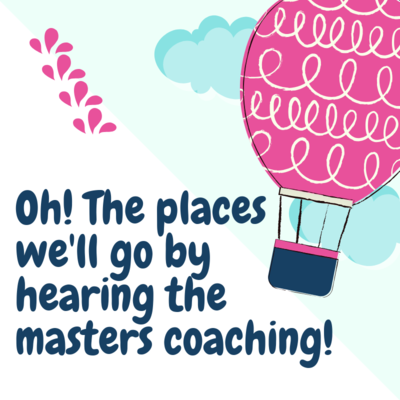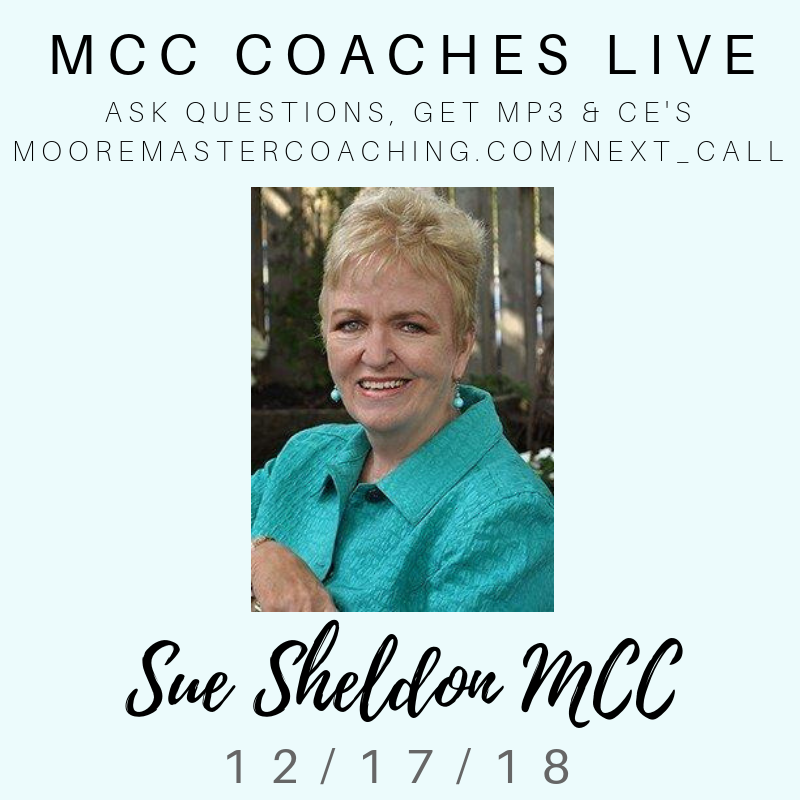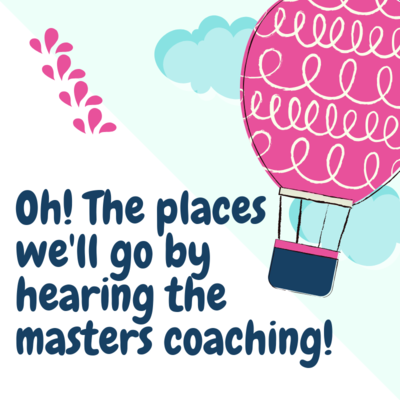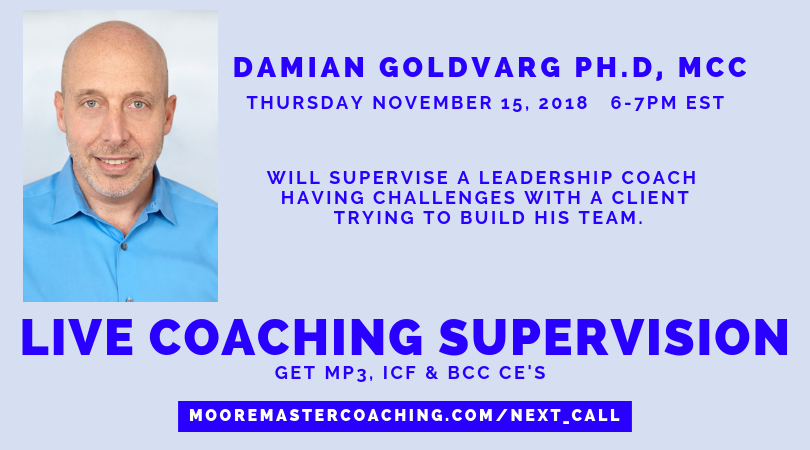|
Blog |
 |
|  |
Welcome to the Moore Master Coaching
"Coach Talk" Blog!
*Please know that any post deemed to be disrespectful or not relevant to the conversation will not be approved.
Monday, January 28 2019
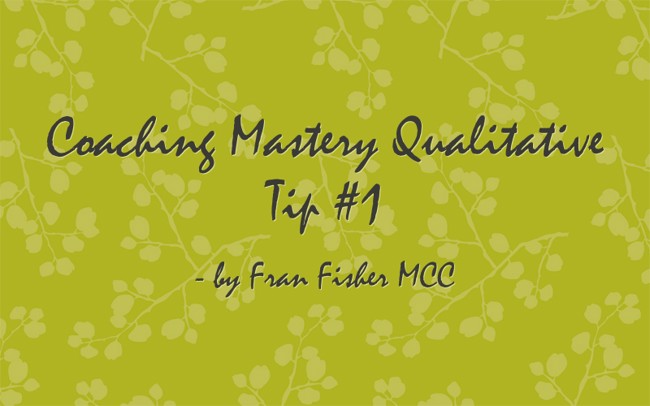
This is the 1st in a 13 part mini blog series that will share Thirteen Coaching Mastery Qualitative Tips by Master Coach Fran Fisher.
#1 of 13
“BE WITH” the client versus “DO TO” the client
BEING WITH = being fully present; listening for who and how the client is being (values, strengths, beliefs, etc.); responding to (words, language, emotion, etc.) Paying attention to the subtle nuances of the client’s shifts of energy, or changes in direction.
DOING TO = problem solving, asking leading questions, offering unsolicited suggestions, offering your own analysis (“So that means____.” Instead of asking “What meaning do you make of that?”)
BEING WITH is being a conduit for emergence; DOING TO is a focus on performance and methodology.
Inquiry: What does it mean to be fully present? What is the impact of my authentic presence with my client?
@Fran Fisher 2019 all rights reserved
Fran Fisher is a Master Certified Coach (MCC), accredited by the International Coach Federation. She is a visionary leader, international speaker, and published author. Fran specializes in providing coaching services for visionary leaders, executives, and business owners, collaborative work teams, as well as coaching and mentoring for experienced coaches.
Recipient of The Lifetime Achievement Award 2012 by the ICF Chapter Washington State, Fran is recognized internationally as one of the pioneers and champions for coaching. She served as a founding International Coach Federation, ICF, Executive Board member, and co-chair of the Ethics and Standards Committee, responsible for developing the Credentialing Programs for aspiring coaches and training schools. Fran was the first Executive Director of the Association for Coach Training Organizations, ACTO. She has been serving ICF as a PCC and MCC Credentialing Assessor since 1998.
www.franfishercoach.com
Monday, January 14 2019
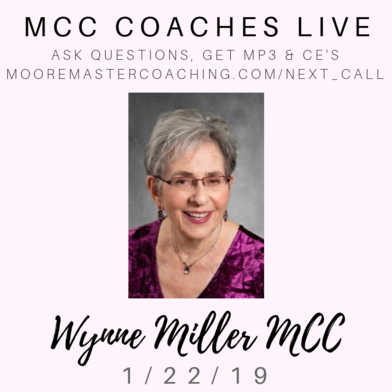
Join us for this call with a coaching pioneer! Wynne brings a fascinating and wide range of experience and wisdom to her coaching. On Tuesday January 22nd from1-2pm ET she'll be coaching not only someone she's never met, she doesn't know the topic & this client has never been coached before! Gonna be good! Hope you can join us.
Tuesday, January 08 2019

How to Have the Life You Yearn For: An Evening with Liz Gilbert
By Master Coach Terry DeMeo
(previous MMC guest coach and blogger)
“What are you willing to give up in order to have the life you pretend you want?” Liz Gilbert, the wildly successful, beloved author of Eat, Pray, Love, told an audience of several hundred women at Miami’s Unity on the Bay Church that this has been the most important question in her life.
At the time, Liz was in her twenties, working a string of menial jobs in order to survive in New York City. The question was posed to her by a woman she deeply admired. She yearned for time to write and wasn’t finding it. This “older” woman, in her fifties, had what Liz wanted most of all—a full-time creative life.
The question devastated her. What are you willing to give up in order to have the life you pretend you want? She realized that until she was willing to claim that life by devoting herself to it, and even sacrificing herself to it, she was pretending.
The woman had even more tough love for her–going on to tell her that she’d have to not only say no to things she didn’t want to do, she’d have to say no to things she did want to do.
This, Liz told us, is how claim what we care most about. We may have to give up things we want to do. And until we do that, we are only pretending. To have the lives we yearn for we need to set priorities and to honor them.
Today’s woman, Liz said, is fierce, courageous, badass, fabulous, compassionate, giving, but we lack the most important quality we need to have the lives we want.
We are not relaxed.
And being relaxed she said, is the key separating the wheat from the chaff of life—finding what is truly and deeply meaningful, important and worthwhile. Separating what we want from what we pretend we want.
But this doesn’t mean taking the occasional hot bath or a nap and waiting until the chaos and the difficulties are over. We cannot wait until everything settles down, sprinkling a few guilty breaks in between the 10,000 things that demand our attention.
My coaching clients, who often come to me in crisis situations—divorce, illness, job upheaval—have heard me say this very thing over and over. We cannot wait. We must meet even the deepest challenges, with an attitude of calm, both inside and out. It’s the key to being at our best as we handle our very full lives. It’s the key to protecting our time, our health and immune systems, our ability to make decisions, and the only hope we have for deeply and lasting joy in our lives.
Imagine that tomorrow you wake up to the exact chaos and demands that exist in your life today, but with one significant difference. Imagine you wake up relaxed. Imaging that you step into the fray of your life with ease.
Imagine you are handling your same life, from the minor annoyances to the major crises, from the traffic jams to the divorce, from the red wine spilled on the rug to the upheaval at your workplace, imagine handling that life, your life exactly as it is, from a state of relaxed ease.
This doesn’t mean we’re blithely ignoring the realities of our lives. This isn’t denial or irresponsibility. But we take responsibility for only that for which we are truly responsible, and we approach it all as calmly as possible. We understand the difference between worry, which debilitates us, and concern, which allows us to respond appropriately.
To do this, Liz pointed to three necessary elements:
- Priorities: What do we care most deeply about? What and who do we want to spend out limited time with? What are we willing to give up to have the life we want? Facebook? Television? Wine? The pull of other people’s business—things they are totally capable of handling on their own? Setting priorities means we let our friends and families manage their responsibilities. And we protect our very limited time and energy wherever possible.
- Boundaries: To set boundaries, we need to know our priorities, and from there, we draw a sacred circle around them.Joseph Campbell was once asked the question what is sacred. His response? You draw a circle and say everything within it is sacred. We can do it ourselves. It isn’t up to a priest, a pastor, a rabbi, or an imam. We can do it privately, alone. We get to say what is sacred for us, what comes inside the circle and what stays outside.For women, Liz reminded us, the sacred must include our bodies. We must protect and respect our amazing, sacred bodies.
- Mysticism: If this is the only world we are tuned into, it’s brutal–full of chaos, suffering, and dysfunction. To stay calm and relaxed, we must have a sense of the magic beyond us, that ineffable inner awareness that lets us know that “every little thing is gonna’ be alright” and “this, too, shall pass.”We may not get what we want. People betray us and leave us and accidents and illnesses still happen, but the message of the mystics is always this: it’s all going to be alright.Liz told us about how when my mentor, Martha Beck, did her PhD on successful women, they told her all the the obvious things about attaining leadership—finding mentors, setting priorities, etc. But the more she pressed the question, the more these women began to confide in her about their mystical experiences. I heard a voice, I had a dream, I was guided. They said things that made no logical sense.It’s such a common experience, isn’t it? Why did you do that, choose that, how did that happen? I have no idea. It’s beyond logic.
I’m often asked why I dropped out of another coach training after spending a year and $10,000 on it to start over again with Martha Beck. I have no idea. I just knew I had to. I wanted to in a way that was beyond reason. And this action which made no logical or financial sense was the single most important action I ever took to turn my life around from one dominated by doubt and anxiety to one filled with deeply meaningful work and joy that abides.
So sit with this question until the answer comes: “What are you willing to give up in order to have the life you pretend you want?”And as you wait for the answer, find as much calm as you can, wherever you can.
Let’s start the New Year with Liz’s formula. Let’s set priorities, let’s protect them with strong boundaries, and let’s listen to those whispers and inner voices and internal tugs, calling us to go beyond logic and fear, and into the magic and connection and love that awaits us all.
@ Terry DeMeo 2018 all rights reserved
About Terry:
"I'm a Martha Beck Master Certified Coach and I’m part of Martha’s coach training faculty. I also helped Martha design the curriculum and I coordinate her Relationship Certified Coaching Certification Program, and am a Master Certified Relationship Coach. I’m a certified provider of the Myers-Briggs personality assessment, and I’m also a Life Coach School Certified Coach, a HeartMath certified stress management provider and a facilitator of The Work of Byron Katie. I’ve completed graduate coursework in somatic (body-mind) psychology and had training in positive psychology (the study of what goes right with people.) In short, I’ve studied a lot about human transformational change."
www.inner180.com
Thursday, December 27 2018
How important is "pure" coaching to you? If it is, you'll really appreciate the masterful session with Sue Sheldon MCC!
Here are just some of the participant take-aways:
- "That call with Sue was probably one of the best calls I have listened to. Thank you. I am staying with Moore Master Coaching for yet another year and I am hoping that this time next year you are able to read out my name as a newly minted MCC."
- "Several ways to pull from the client that which she already knows."
- "Using the 3 part questions Sue identified in order to set the contract."
Read more take-aways and all about the call -under the "executive" or "life" tab.
Monday, December 10 2018
Sue Sheldon is a business, entrepreneur and life coach. She says all coaching is life coaching!
Sue will be coaching someone who has never been coached before and this will be the first time that they have ever met or spoken. Sue knows nothing about the client or even her topic.
Join us Monday December 17, 12-1pm ET.
Read more about Sue and her call.
Friday, December 07 2018
Seeing is believing!
Getting to witness a coaching Super-Vision session is so cool. You really understand it's immense value to coaches & to our clients.
Here are just a few of the take-aways from the Damian Goldvarg Ph.D, MCC call:
- "Reflecting on is there a possibility there is something we have not seen here together, and offering that inquiry to my client to co-create."
- "Process of examining parallel processes in supervision that may mirror what is going on with client. This can be helpful in addressing challenges/impasses in work together."
- "Asking myself the question: Am I challenging enough with my clients?"
To read about the call and see more take-aways - under the "coaching supervision" tab
Wednesday, November 14 2018
This is a different kind of Moore Master Coaching Call
Damian will be conducting a live coaching supervision session with a Leadership Coach he's never met. She is having a challenge with one of her clients who is having difficulty building a team of people to support the vision
You may have heard of supervision, but do you really know what's involved?
Supervision is a very important coaching resource and getting to hear a session is a real gift.
It offers a number of wonderful benefits:
- It's a twofer: we get to hear master level coaching and supervision at the same time
- Learn coaching skills as well as ways to breakthrough challenges we may have with clients
- Experience how we might benefit from supervision ourselves
- The chance to explore it as a possible career path or an additional path
MMC has had 2 previous master coaching supervision demonstrations and the participants have been asking for more.
So the next one is with Damian Godvarg PhD, MCC on Thursday November 15, 6-7 PM EST.
Read more here
You can check out the previous 2 MMC supervision sessions under the "coaching supervision" tab:
Kathleen Stinnett MCC as a bonus demonstrated a 15 minute supervision session with a coach on the call.
Sam McGill MCC in a full length session supervised another MCCs live coaching demonstration on his call back in the spring.
Monday, November 05 2018

By Annie Gelfand CPCC, MCC
(MMC guest Master Coach (under the leadership tab) and blogger
People everywhere around the world argue. Some do it well, so that each party walks away feeling seen, heard and respected. They may agree to disagree. Their interaction is emotionally intelligent, free of blame, stonewalling and contempt. Other interactions, however, may not go quite as well. We are seeing evidence of these latter interactions more and more throughout the world. As polarities are becoming more obvious, tensions are heightened, we also see that every relationship is only as strong as each individual within it is self-aware.
Unresolved emotional issues left to fester for years, lying unsuspectingly dormant, can get triggered. Before you know it, one of you (or more) has turned into a five year old child having a temper tantrum and not really understanding why.
It is each of our responsibilities to leave no old emotional wound unaddressed. Along the way, however, the challenge is to keep our interactions from escalating to levels of conflict beyond repair. The target is to navigate these difficult conversations where participants can stay free from creating damage and hopefully ultimately generate even greater intimacy and willingness to be vulnerable. The magic key is something John Gottman, author of ‘The Relationship Cure” calls repair bids; a “happy couple’s secret weapon.” The following outlines Gottman’s protocols to catch the conflict before it begins to escalate beyond repair.
7 ways to make a repair bid in the moment to keep from escalation (low level):
1. Use humour to create some levity
2. Ask your partner what they need from you right now
3. Validate their emotions
4. Apologize in the moment
5. Touch them gently
6. Verbally remind both of you that you’re on the same team
7. Empathize with them, “I get you.”
7 ways to make a repair attempt when real emotional damage has been done (high level):
1. Take responsiblity for your behavior
2. Verbally apologize with sincerity
3. Give your partner a hand-written, personalized card
4. Tell them you love them and didn’t mean to hurt them
5. Ask them what they need from you to heal the wound
6. Share your ideas around how you got triggered and how you plan to work on avoiding it happening again
7. Tell your partner why they are worth it and what they mean to you
Although Gottman is referring to romantic couples, these principals can also be applied to any professional relationship. If at least one participant in the relationship is willing to be vigilant, if both parties care about and are invested in the relationship, willing to work on it, and take on the responsibility of offering the “repair bid”, conflict situations may be nipped in the bud.
No matter how badly things go, repair bids go a long way towards healing any chasm.
@2018 Annie Gelfand/Radical Wisdom all rights reserved
Not only a Master Certified Coach, Annie has an MBA, she is a Radical Change Catalyst, Intuition Whisperer, Speaker/Writer/Healer/Creator of Magnitude, Professional Question Asker & Cat Obsessed. Annie spends her days coaching highly intuitive and high-performing professionals who are hungry to discover and live a full unapologetic life devoted to unfolding their own inner wisdom.
Radical Wisdom is "A catalyst of radical change in the workplace and in the world. Viewer discretion is advised. Not appropriate for the average human. Must have courage to change, mega-gigantic dreams and a dash of spunk."
Annie is a writer, artist, healer and Intuition Whisperer who believes in cats, full bodied red wine, dark chocolate, rich, deep connection and that laughter is not only the best medicine, but the best way to get over your daily crap. She coaches individuals, couples and groups.
www.radicalwisdom.com
Friday, October 26 2018

Leadership Issues, Part 4: How Leaders Learn
by Mickey Parsons Psy.D, MCC, BCC
(MMC guest master coach and blogger)
In the fourth of four posts looking at the results of a Workplace Coach survey of 109 business leaders, we look at the critical topic of learning.
See Leadership Issues, Part 1
See Leadership Issues, Part 2
See Leadership Issues, Part 3
Effective leaders know that their own continuous learning is essential, and most are hungry for growth, new knowledge and improvement. When we asked leaders how they prefer to learn, the largest share (27.6%) named discussions with others as their preference, followed in equal measure by coaching or mentoring and by reading.
When I look at these results, I suspect there is overlap between “discussions with others” and “coaching/mentoring” and that taken together these two responses point to the kinds of developmental relationships that are pivotal for effective leaders.
We also know that most leaders learn best by taking on challenging assignments. This means it makes sense for you to cultivate developmental relationships with individuals who will encourage you to learn by doing. You want people who will challenge and support you as you expand your roles and responsibilities to include new and innovative projects and building new teams and capabilities.
Ultimately, we all need mentors and coaches in our work and personal lives. We develop wisdom from those who are more knowledgeable and experienced and who have a good understanding of human nature. Who can help you learn new skills? What stretch assignment will enhance your leadership acumen?
Make a list today of the formal learning opportunities, the developmental relationships and the challenging assignments that will help you become a more confident and effective leader in 2018. Then map out a schedule for how and when you will make it happen.

|








